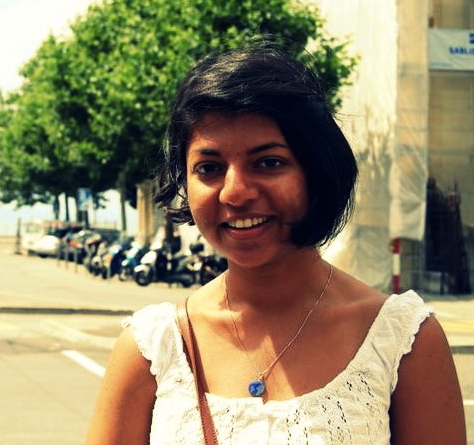
Malaika Neri has a knack for finding interesting opportunities to study and work abroad on independent projects. Between her sophomore and junior year at New York University’s (NYU) Gallatin School of Individualized Study, where she studied Economics and International Development, Malaika was one of 19 people chosen for the Swiss government’s ThinkSwiss Research Scholarship. She spent the summer of 2010 at the Université de Neuchâtel in Switzerland where she researched and published an academic paper on the Swiss response to the 2008 financial crisis. She subsequently completed a year’s coursework for a Master’s in Public Administration at NYU’s Wagner School and was one of ten students selected for the inaugural class of the NYU Gallatin Fellowship in Global Human Rights. The fellowship provided her a $5,000 grant to spend the summer working for OTIV Alaotra Mangoro, a microfinance organization in Madagascar, and enabled her to study how microfinance can be used to fulfill social and economic rights. Now based in Quito, Ecuador as an international development consultant, Malaika connected with us to tell us more about that first, inspirational research trip to Switzerland.
1. What inspired you to apply for the ThinkSwiss Research Scholarship?
I had wanted to study abroad, like many of my friends in college were doing, but wasn’t interested in simply “studying abroad” for the sake of it; neither did I want to go abroad and volunteer, when I could do that in my own community. So I searched online for opportunities to be abroad, doing something academic, such as research. That’s when I found the ThinkSwiss Research Scholarship, which was open to any major, and offered the chance to do research at a Swiss university or research institute. It was perfect!
2. What do you think made your application stand out?
One of the primary selection criteria for the scholarship is serving as a student ambassador of a U.S. university in Switzerland. In my application, I wrote about moving to the United States from India with my family, and although my accent and body language often continue to mark me as a foreigner in the U.S., I realized that there was no point in rejecting the opportunity to learn more about what a new culture has to offer. I’m fairly certain that this anecdote swayed the acceptance committee in my favor. I was also very specific in my reasons for choosing the Institute for Economic Research (Irene) at the Economics Department of the Université de Neuchâtel as my host institution, and for selecting a school in the francophone part of the country.
3. What did you accomplish during the fellowship and how has the experience influenced your career goals?

Through the three month fellowship, I was able to research and write an in-depth report on the Swiss government’s reaction to the 2008 financial crisis. Being in Switzerland helped enormously; because the government is so extraordinarily responsive, I was able to pick up the phone and call the Ministry of Finance, and they helped me find all the information I needed. It was an amazing experience. When I came back to the U.S., I found an academic journal that was willing to publish my report, and a few months later, saw it in print!
Conducting research in Switzerland was an extremely formative experience in my decision to pursue a PhD., and to continue the study of political economy. Being part of an academic community, not simply as a student but as a colleague, offered the opportunity to be among brilliant minds who were also supportive peers and inspired me to be a part of that world. All in all, I’m very, very grateful to have had the experience.
The next deadline for the ThinkSwiss Research Scholarship is April 30, 2013. Apply now.
Malaika Neri graduated in 2012 with a BA in Development Economics and International Development at the NYU Gallatin School of Individualized Study. Malaika was a writer for the book “Telecentre Women Digital Literacy Campaign: Empowerment Through Technology, a global initiative of Telecentre.org Foundation and the International Telecommunications Union of the United Nations. She has also developed social impact strategy analysis for a variety of non-profits, philanthropies, and corporate clients. She was a semi-finalist in the 2012 NYU Entrepreneurship Challenge and accepted into NYU Reynold’s Changemaker Challenge, part of the Catherine B. Reynolds program in Social Entrepreneurship.
© Victoria Johnson 2013, all rights reserved.